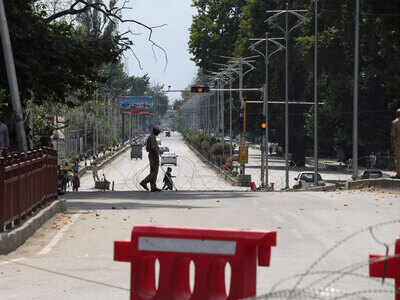
Highlights
WASHINGTON: Outside of expressing concern about curtailment of civil liberties and the human rights situation in the Kashmir Valley, the international community is conspicuously not challenging or objecting to India’s legislative and constitutional moves regarding the state of Jammu and Kashmir, accepting New Delhi’s position that it is an internal issue.
Responses from the Trump administration and US lawmakers to the crisis this week has centered on the ground situation — including the restrictions on communication and civil liberties — and the broader security implications in the region, rather than any censure of the constitutional changes India has brought about to further bring the state into the national mainstream.
“The United States is closely following India’s legislation regarding the new territorial status and governance of Jammu and Kashmir. We note the broader implications of these developments, including the potential for increased instability in the region. The US calls for calm and restraint by all parties,” the US State Department said on Wednesday, even as its pointperson for the region Alice Wells arrived in New Delhi for talks. “We continue to be concerned by reports of detentions and the continued restrictions on the residents of Jammu and Kashmir. We urge respect for individual rights, compliance with legal procedures, and inclusive dialogue with those affected,” a state department spokesperson added.
Washington also cautioned Islamabad, which has threatened to raise the temperature in the region through aggressive moves, calling on all parties to maintain peace and stability along the Line of Control, “including taking firm and resolute steps to combat cross-border terrorism” – an implicit reference to Pakistan’s well-chronicled policy of infiltrating terror groups into India and bleeding it through terror strikes.
The US also reverted to its familiar position that it continues to support “direct dialogue between India and Pakistan on Kashmir and other issues of concern,” finessing President Trump’s offer to mediate, remarks that irked India and ignited hopes in Pakistan of third-party intervention. Trump himself is yet to speak on the current situation.
The US Congress too warned Pakistan against what two leading lawmakers termed “retaliatory aggression—including support for infiltrations across the Line of Control,” while calling on Islamabad to “take demonstrable action against the terrorist infrastructure on Pakistan’s soil.”
The statements by the administration and the US House Foreign Relations Committee indicated that Pakistan’s caterwauling on Kashmir issue and its claim of locus standi in the matter had made little impression in Washington, although there is plenty of concern about how India is handling the situation from a human rights perspective.
“As the world’s largest democracy, India has an opportunity to demonstrate for all its citizens the importance of protecting and promoting equal rights, including freedom of assembly, access to information, and equal protections under the law. Transparency and political participation are the cornerstones of representative democracies, and we hope the Indian government will abide by these principles in Jammu and Kashmir,” Representative Eliot Engel, chairman of the House Foreign Affairs Committee, and Senator Bob Menendez, Ranking Member of the Senate Foreign Relations Committee, both Democrats, said in the statement.
Even beyond the US, Pakistan found few takers for its argument that it has any locus standi in the developments, although there are many expressions of concern about the ground situation in the valley. Through Wednesday and Thursday, Islamabad attempted to crank up support for its claims, with little success, as most reactions centered not on the legality of India’s moves but on the human rights situation, something more sober Pakistani commentators noted.
“Notice that even here, the focus and emphasis is on the human rights violations and the impunity enjoyed by Indian security forces in Kashmir and only secondarily on the annexation and truncation of occupied Kashmir,” one analyst wrote, referring to a statement by the International Committee of Jurists, different from the International Court of Justice that spinmeisters in Islamabad tried to confuse it with.
The analyst noted that “even secretary general of the United Nations would only say 'we urge all parties to exercise restraint' without adding anything more,” and that “China issued a strongly-worded statement, but kept the focus on Ladakh, where it has territorial claims.”
Responses from the Trump administration and US lawmakers to the crisis this week has centered on the ground situation — including the restrictions on communication and civil liberties — and the broader security implications in the region, rather than any censure of the constitutional changes India has brought about to further bring the state into the national mainstream.
“The United States is closely following India’s legislation regarding the new territorial status and governance of Jammu and Kashmir. We note the broader implications of these developments, including the potential for increased instability in the region. The US calls for calm and restraint by all parties,” the US State Department said on Wednesday, even as its pointperson for the region Alice Wells arrived in New Delhi for talks. “We continue to be concerned by reports of detentions and the continued restrictions on the residents of Jammu and Kashmir. We urge respect for individual rights, compliance with legal procedures, and inclusive dialogue with those affected,” a state department spokesperson added.
Washington also cautioned Islamabad, which has threatened to raise the temperature in the region through aggressive moves, calling on all parties to maintain peace and stability along the Line of Control, “including taking firm and resolute steps to combat cross-border terrorism” – an implicit reference to Pakistan’s well-chronicled policy of infiltrating terror groups into India and bleeding it through terror strikes.
The US also reverted to its familiar position that it continues to support “direct dialogue between India and Pakistan on Kashmir and other issues of concern,” finessing President Trump’s offer to mediate, remarks that irked India and ignited hopes in Pakistan of third-party intervention. Trump himself is yet to speak on the current situation.
The US Congress too warned Pakistan against what two leading lawmakers termed “retaliatory aggression—including support for infiltrations across the Line of Control,” while calling on Islamabad to “take demonstrable action against the terrorist infrastructure on Pakistan’s soil.”
The statements by the administration and the US House Foreign Relations Committee indicated that Pakistan’s caterwauling on Kashmir issue and its claim of locus standi in the matter had made little impression in Washington, although there is plenty of concern about how India is handling the situation from a human rights perspective.
“As the world’s largest democracy, India has an opportunity to demonstrate for all its citizens the importance of protecting and promoting equal rights, including freedom of assembly, access to information, and equal protections under the law. Transparency and political participation are the cornerstones of representative democracies, and we hope the Indian government will abide by these principles in Jammu and Kashmir,” Representative Eliot Engel, chairman of the House Foreign Affairs Committee, and Senator Bob Menendez, Ranking Member of the Senate Foreign Relations Committee, both Democrats, said in the statement.
Even beyond the US, Pakistan found few takers for its argument that it has any locus standi in the developments, although there are many expressions of concern about the ground situation in the valley. Through Wednesday and Thursday, Islamabad attempted to crank up support for its claims, with little success, as most reactions centered not on the legality of India’s moves but on the human rights situation, something more sober Pakistani commentators noted.
“Notice that even here, the focus and emphasis is on the human rights violations and the impunity enjoyed by Indian security forces in Kashmir and only secondarily on the annexation and truncation of occupied Kashmir,” one analyst wrote, referring to a statement by the International Committee of Jurists, different from the International Court of Justice that spinmeisters in Islamabad tried to confuse it with.
The analyst noted that “even secretary general of the United Nations would only say 'we urge all parties to exercise restraint' without adding anything more,” and that “China issued a strongly-worded statement, but kept the focus on Ladakh, where it has territorial claims.”
more from times of india news
Trending Topics
LATEST VIDEOS
Trending Videos
 English Song 'House Of Mercy' Sung By Sarah Jarosz
English Song 'House Of Mercy' Sung By Sarah Jarosz  Malaika Arora looks surreal as she embodies goddess of the sea in her latest picture
Malaika Arora looks surreal as she embodies goddess of the sea in her latest picture  Priyanka Chopra makes fans happy as she shares never before seen sari pictures from 'Jophie' wedding
Priyanka Chopra makes fans happy as she shares never before seen sari pictures from 'Jophie' wedding  Latest Punjabi Song 'Jugni Mastkalandar' (Lyrical) Sung By Arif Lohar Featuring Fozia Hassan
Latest Punjabi Song 'Jugni Mastkalandar' (Lyrical) Sung By Arif Lohar Featuring Fozia Hassan
More from TOI
Navbharat Times
Featured Today in Travel
Quick Links
August 15RTI BillGujarat ElectionKarnataka ElectionMP Lok Sabha electionMaharashtra election 2019West Bengal Lok SabhaTamil Nadu election 2019UP Election 2019Bihar election 2019UP Election DateAndhra Election DateBihar Election DateAndhra Assembly ElectionLok SabhaMP Election DateMaharashtra Election DateShiv SenaYSRCPTDPWB Election DateJDUCongressBJP newsGujarat Election DateSC ST ActUIDAIIndian ArmyISRO newsSupreme CourtRajasthan Election DateTelangana Election DateTamilrockers 2018Uttarakhand newsSikkim newsOrrisa newsKarnataka Election DateNagaland newsSatta KingManipur newsMeghalaya news
Get the app





